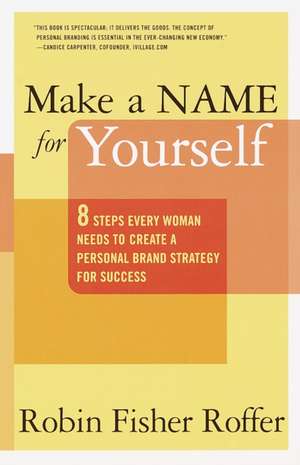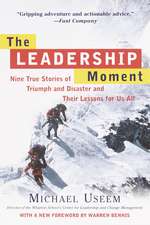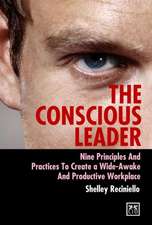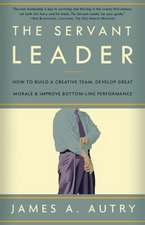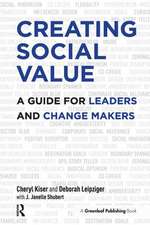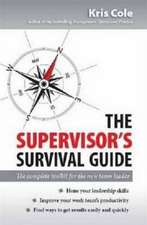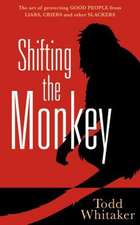Make a Name for Yourself: Eight Steps Every Woman Needs to Create a Personal Brand Strategy for Success
Autor Robin Fisher Rofferen Limba Engleză Paperback – 31 dec 2001
For any woman who has ever gone to work in the morning and thought "there must be more," branding expert Robin Fisher Roffer reveals the eight surefire steps for developing a unique, personal brand strategy for success by identifying your extraordinary attributes, thinking about your values and passions, and learning how to use them to build a successful and fulfilling professional life. Whether you’re starting out in the workforce, beginning your own business, changing careers, or tying to make it in the corporate world, Roffer will help you to uncover a focused direction for your career that celebrates you.
Preț: 104.81 lei
Nou
Puncte Express: 157
Preț estimativ în valută:
20.06€ • 20.82$ • 16.72£
20.06€ • 20.82$ • 16.72£
Carte disponibilă
Livrare economică 04-18 martie
Preluare comenzi: 021 569.72.76
Specificații
ISBN-13: 9780767904926
ISBN-10: 0767904923
Pagini: 224
Dimensiuni: 132 x 205 x 14 mm
Greutate: 0.19 kg
Editura: Crown Business
ISBN-10: 0767904923
Pagini: 224
Dimensiuni: 132 x 205 x 14 mm
Greutate: 0.19 kg
Editura: Crown Business
Notă biografică
An international brand strategist, Robin Fisher Roffer is the president of Big Fish Marketing, Inc., and Fishnet in Los Angeles, and Little Pond Productions in Atlanta. Roffer’s prestigious client list includes MTV, Bloomberg, Fox Cable Networks, Columbia TriStar International Television, Lifetime, Univision Networks, Sony, Discovery Networks, Hallmark Channel, and The History Channel. An acclaimed speaker on the topics of corporate and personal branding, Roffer lives in Los Angeles with her husband and daughter.
Extras
Step 1
Dig Deep to Unearth Who You Are
I believe that we're here in the world for a purpose. Everything that happens to us, good or bad, is a lesson to help us discover what that purpose is and fulfill it. This is the real business of life, our destiny cycle, played out in our love life and our work life.
Your true purpose can only be discovered when you've looked deeply and honestly into your heart and allowed the true you to declare herself. She may be someone very different from the you that other people see today, but she is the soul of your brand and it's with her help above all others that you'll find your path and your success. When you've discovered her you can begin to honor her by revealing her dynamic spirit to the world. She will reward you with everything you ever dreamed was possible.
What words come to mind when people say your name? What do people feel when they see you? If you can't answer these questions easily, join the club. How can you ever know what someone else is thinking, anyway? And after all, how objective can you really be about yourself?
The truth is you can know what people are thinking about you if you've put certain thoughts in their heads.
What's the Buzz on You?
I'm not talking about mind control exactly, but branding is about having a strong influence over how you're perceived. Look how the best brands bombard us on a daily basis with in-your-face advertising designed to influence how we think and feel about their products. Coca-Cola wants us to think "refreshing" when we hear their name, and to make sure we do they spend big dollars to promote their brand as invigorating and exhilarating. Disney's name is indelibly associated with family values and wholesome kid entertainment. MTV has influenced us to think of hip young people and cutting-edge music. Think Volvo, think safety. Think Jeep, think adventure.
Apply brand promotion to people and you get similar results. For instance, what words come to mind when you think of Madonna? How about Oprah? Or Martha Stewart? Not too long ago, I asked a group of women in the film industry to describe these powerful women, and they came up with these three lists.
organized * outrageous * compassionate
creative * sexy * spiritual
anal * chameleon * intelligent
intimidating * brassy * genuine
It's not too hard to guess which list applies to which celebrity, is it? That's because in marketing terms, all three women are super powerful brands. Their names evoke a strong, even emotional response from us, and we pretty much know what to expect from each of them, which is why we remember them. They're consistent.
Consistency is one of branding's most important laws. Madonna, Oprah, and Martha build their brands by making career choices that reinforce what they're known for. Madonna changes her look almost as often as Oprah chooses another book or Martha recovers a sofa. Oprah continues to make women aware of issues that matter, and we'll never see Martha put out anything short of domestic perfection. Madonna has made extreme inconsistency a part of her brand--changing from the blond bombshell she personified during and around the filming of the movie Dick Tracy with Warren Beatty in 1990, to the raven-haired Indian gurette in exotic saris of 1999. Doing so, she's pretty much locked in to being consistently inconsistent. I don't recommend this. Brand consistency is critical to developing brand loyalty. Brand inconsistency erodes confidence. And so Madonna's "chameleon" quality may ultimately undermine her success. She may never be able to rest or stop changing because if she did, her audience would get bored.
Consistency, clarity, and authenticity are the holy trinity of a great brand.
When I'm hired to help a cable network or Internet company develop its brand, I begin by analyzing the brand's distinguishing qualities, its key attributes, its defining characteristics. If I were doing a brand analysis of Martha and Madonna, for instance, they would look something like this:
Martha Stewart
Brand Description
Goddess of her own Omnimedia empire (magazine, syndicated column, and TV show), Martha reigns supreme over every avenue of domesticity: home crafts, home decor, and home entertaining. Worth billions now that she's gone public, her ubiquitous presence is secure for the rest of her baking years and beyond. Martha does everything right, she does it meticulously, and she's strict--she doesn't fool around and she expects us to do as she does. You either love her or hate her.
Values
Her core values reflect her quest for perfection, and her love of the best and the beautiful. They play to the new American dream of homemaking: More is better--and you have to admit, it all looks great!
Key Attributes
* Vision coupled with flawless taste
* A love for detail that makes something as mundane as repositioning the sofa seem fascinating
* An in-charge personality
Packaging
Down-to-earth looks, lots of slacks, overalls, gardening clogs, button-up blouses, barn jackets, minimal make up; simple, short hair style. A very casual low-maintenance look balances a very highly contrived product.
Brand Power
* Martha at Kmart--'nuf said
* Soaring stock valuations
* Women all over America are captivated by her and the world she's created
Tagline
"It's a good thing!"
Positioning:
The last word in American of home crafts, decor, and entertaining
Bottom line
Her arrogance is legion, her attitude intimidating, her taste and talent enviable.
Madonna
Brand Description
Innovative, influential, and inspiring, a singer, dancer, composer, producer, actor, executive, humanitarian, and mother, Madonna is embedded in our pop culture and collective consciousness as an icon for the liberated, highly physical, sexual female. Always an original, sometimes outrageous, she's never shy about showing us exactly who she is.
Key Attributes
* Dazzling, alluring, in-your-face!
* She brings together music, extravagant theatrics, and dance to wow sold-out audiences around the world.
* Touches something primal in us--evokes extreme emotional response.
* She has more than confidence--she has guts. She pushes the envelope.
* An original creative vision and the ability to pick up on and set trends in everything from fashion to design to music.
Brand Power
* She sells records! No less than nineteen top ten singles in the past fourteen years, eleven of them number one.
* Her influence on fashion is revolutionary.
* Recognizing the creative and commercial impact of the music video lexicon, no one has done more to marry music and image.
Quote
"I live faster than everyone else . . . out of my own curiosity and hunger for information and change."
What People Think of Madonna
She's a great marketer.
What People Are Missing
She's an astonishing talent and a reflection of what many women secretly aspire to be. And that scares a lot of people.
These analyses aren't identical in their content because branding isn't done with a cookie cutter, but the process is one that can be duplicated, no matter what or who the brand. Martha, Madonna, and Oprah have created their own personal successes in just the same way any other successful brand does--by focusing on who they are and what is unique about them, on who they want to reach and how they want to be thought of, and by packaging and promoting themselves to accomplish their goals.
Your brand's success is achieved in the same way. The very first step is to model your brand on your authentic self. There's only one like it in the world, which makes it (1) distinct from any other and (2) something you and only you can pull off.
To do this you must dig deep to know who you are, what you stand for, and what you believe in.
Mary Beth
At age twenty-eight, Mary Beth thought she was finally getting a handle on that age-old question "Who am I?"--and it was neither the privileged southern debutante or the Yuppie corporate drone that her parents thought she should be. Mary Beth was different--always had been. When she was seven, she transformed her mother's favorite tablecloth into a giant jigsaw puzzle. In eighth grade she had used her watercolors to dye her light-colored hair purple. She had flair. And as an adult, she had far greater ambitions than what the account management ladder offered at Grey Advertising, which was the path her family was aggressively encouraging her to follow.
Mary Beth had graduated from Emory University in Atlanta with a communications degree, earned an MBA at Kellogg, and then moved to Manhattan with a girlfriend. Her first job out had been with Grey as an account coordinator. She worked for them for several years, but she had no passion for account work, and she believed that traditional agencies like Grey were wanna-bes in the media revolution, no longer fully equipped to serve clients. Besides, her salary was uninspiring compared to what many of her classmates at Kellogg were earning by now. And salary was important to Mary Beth.
She knew intuitively that the money would come if she could reposition herself from a "suit" to a "creative," so ignoring her parents' gloomy predictions, she left Grey and enrolled at the prestigious Parsons School of Design.
See Yourself as a Brand
Even without a physical description of Mary Beth, you begin to get a picture of her, and a sense of her courage and determination to work at something that resonates with who she is and what she stands for. But it's not always so easy to define those two essential elements. So here's a game I play with women who attend my workshops to get them thinking about these kinds of existential questions. I ask:
You are a product: What are you, and why?
Without my prompting, the answer to this question is invariably a product with a well-known brand name, and the answer to "why" almost always incorporates the brand's tagline, that short, upbeat phrase that everyone associates with the brand. No one says "chicken soup." They say, "I'm Knorr's Chicken Bouillon--because I add flavor to everything." They don't say "champagne," but "Veuve Clicquot--because I'm bubbly, expensive, and enjoyed by people with the very best taste." They don't say they're a "car," but a "BMW--because I'm the ultimate driving machine!"
Notice that the justifications in these objectives are all positive statements. "I add flavor . . ." "I'm bubbly . . ." "I'm the ultimate . . ." In this game, you want to be thinking in the most positive terms about yourself. Branding is positive by nature. It will bring out the best in you.
But not all of us are 100 percent perky, "up with people," everything-is-rosy optimists. In being true to our authentic selves, should we pretend there is no darker side?
Don't let this be a moral dilemma. Never play the victim in business. Never play a loser, or a weakling, or a bad guy just to get a reaction. "Never let them see you sweat," as my dad says.
Even though we do sweat. Even though loss is an inevitable part of life. Even though sometimes we are weak, and sometimes we're not as nice as we should have been. It's usually a good idea to differentiate your professional life from your private life. It's rarely in a brand's best interest to "tell all," nor should it be necessary.
Maybe you're competent and dedicated and highly skilled in your line of work, but you had a difficult childhood and you're emotionally vulnerable. Or you're basically an angry person, or you're depressed. These are not assets at work and they won't contribute to the success of your brand--in fact, they can become obstacles to success if they're not kept in check. There's a difference between honoring your authentic self and sharing your personal truth, and moaning, complaining, and being explosive.
Spend some time thinking of a brand you can identify with. Brands come in categories, so start by deciding what classification you could fit. Are you a food product, providing sustenance to people? And if so, what kind of food: crisp, smooth, liquid, solid, new, improved? Do any of these adjectives speak to you?
Are you an appliance that's the top of its line, technologically? Is that appliance practical or extravagant, electric or battery-run, high tech, hand-held, or digital? Do any of these descriptive phrases contain an element you can relate to--on any level? Try to make your brand, and your reason for resonating with that brand, as specific and detailed as possible. The details will tell us much about the meaning beyond the brand name.
Maybe you're a fashion brand: Does Versace describe you, or are you a J. Crew type? Or do you identify with a media brand like CNN or MTV, or with a digital brand like AOL or Amazon.com? Your brand category might be a vehicle, or a financial institution, or a major metropolis. Brands come in all shapes and sizes. Any noun can be a brand.
When you've thought of a brand whose description seems to fit you personally, try substituting your name for the brand name. The workshop participant who said she was Knorr's Chicken Bouillon because she added flavor would now say: "I'm Kate Watkins. I add flavor to everything!" Or "I'm Lori Deck--bubbly, expensive, and enjoyed by people with the very best taste."
If you answered, "I'm a Maytag washing machine because I'm completely dependable and never break down," can you claim the same about yourself in real life?
Mary Beth
Influenced by the startling images of John Lennon and Yoko Ono, Albert Einstein, Alfred Hitchcock, and other visionaries that Apple Computer has associated with its brand in stark black-and-white billboards, Mary Beth aligned her personal brand with the company and its tagline. She wrote, "I'm Mary Beth, I 'think different.' "
If the brand you chose doesn't describe you accurately, keep trying. Find a brand that suits you better. By working at it, the exercise will reveal some of your essential ingredients, which we'll use to customize a brand description later in this chapter.
Search for the Soul of Your Brand
Like most successful brands, Apple reveals its soul in its advertising. It demonstrates its own visionary qualities--passion and creativity--in the extraordinary, far-thinking people it associates with its logo on those billboards. What words speak of your personal value system, that metronome for personal behavior--what you stand for, what you want to live up to, what you consider most important to your inner life and well-being?
Your values are integral to your brand qualities.
Mary Beth says she values money, courage, creativity, and vision. Kate Watkins at the workshop, who said she "adds flavor," may count diversity or the spice of life as one of her values. It's likely that Lori Deck, who said she was "bubbly," values fun and enthusiasm most of all. The workshop participant who called herself "the ultimate driving machine" could consider hard work and perseverance among her most cherished values.
Dig Deep to Unearth Who You Are
I believe that we're here in the world for a purpose. Everything that happens to us, good or bad, is a lesson to help us discover what that purpose is and fulfill it. This is the real business of life, our destiny cycle, played out in our love life and our work life.
Your true purpose can only be discovered when you've looked deeply and honestly into your heart and allowed the true you to declare herself. She may be someone very different from the you that other people see today, but she is the soul of your brand and it's with her help above all others that you'll find your path and your success. When you've discovered her you can begin to honor her by revealing her dynamic spirit to the world. She will reward you with everything you ever dreamed was possible.
What words come to mind when people say your name? What do people feel when they see you? If you can't answer these questions easily, join the club. How can you ever know what someone else is thinking, anyway? And after all, how objective can you really be about yourself?
The truth is you can know what people are thinking about you if you've put certain thoughts in their heads.
What's the Buzz on You?
I'm not talking about mind control exactly, but branding is about having a strong influence over how you're perceived. Look how the best brands bombard us on a daily basis with in-your-face advertising designed to influence how we think and feel about their products. Coca-Cola wants us to think "refreshing" when we hear their name, and to make sure we do they spend big dollars to promote their brand as invigorating and exhilarating. Disney's name is indelibly associated with family values and wholesome kid entertainment. MTV has influenced us to think of hip young people and cutting-edge music. Think Volvo, think safety. Think Jeep, think adventure.
Apply brand promotion to people and you get similar results. For instance, what words come to mind when you think of Madonna? How about Oprah? Or Martha Stewart? Not too long ago, I asked a group of women in the film industry to describe these powerful women, and they came up with these three lists.
organized * outrageous * compassionate
creative * sexy * spiritual
anal * chameleon * intelligent
intimidating * brassy * genuine
It's not too hard to guess which list applies to which celebrity, is it? That's because in marketing terms, all three women are super powerful brands. Their names evoke a strong, even emotional response from us, and we pretty much know what to expect from each of them, which is why we remember them. They're consistent.
Consistency is one of branding's most important laws. Madonna, Oprah, and Martha build their brands by making career choices that reinforce what they're known for. Madonna changes her look almost as often as Oprah chooses another book or Martha recovers a sofa. Oprah continues to make women aware of issues that matter, and we'll never see Martha put out anything short of domestic perfection. Madonna has made extreme inconsistency a part of her brand--changing from the blond bombshell she personified during and around the filming of the movie Dick Tracy with Warren Beatty in 1990, to the raven-haired Indian gurette in exotic saris of 1999. Doing so, she's pretty much locked in to being consistently inconsistent. I don't recommend this. Brand consistency is critical to developing brand loyalty. Brand inconsistency erodes confidence. And so Madonna's "chameleon" quality may ultimately undermine her success. She may never be able to rest or stop changing because if she did, her audience would get bored.
Consistency, clarity, and authenticity are the holy trinity of a great brand.
When I'm hired to help a cable network or Internet company develop its brand, I begin by analyzing the brand's distinguishing qualities, its key attributes, its defining characteristics. If I were doing a brand analysis of Martha and Madonna, for instance, they would look something like this:
Martha Stewart
Brand Description
Goddess of her own Omnimedia empire (magazine, syndicated column, and TV show), Martha reigns supreme over every avenue of domesticity: home crafts, home decor, and home entertaining. Worth billions now that she's gone public, her ubiquitous presence is secure for the rest of her baking years and beyond. Martha does everything right, she does it meticulously, and she's strict--she doesn't fool around and she expects us to do as she does. You either love her or hate her.
Values
Her core values reflect her quest for perfection, and her love of the best and the beautiful. They play to the new American dream of homemaking: More is better--and you have to admit, it all looks great!
Key Attributes
* Vision coupled with flawless taste
* A love for detail that makes something as mundane as repositioning the sofa seem fascinating
* An in-charge personality
Packaging
Down-to-earth looks, lots of slacks, overalls, gardening clogs, button-up blouses, barn jackets, minimal make up; simple, short hair style. A very casual low-maintenance look balances a very highly contrived product.
Brand Power
* Martha at Kmart--'nuf said
* Soaring stock valuations
* Women all over America are captivated by her and the world she's created
Tagline
"It's a good thing!"
Positioning:
The last word in American of home crafts, decor, and entertaining
Bottom line
Her arrogance is legion, her attitude intimidating, her taste and talent enviable.
Madonna
Brand Description
Innovative, influential, and inspiring, a singer, dancer, composer, producer, actor, executive, humanitarian, and mother, Madonna is embedded in our pop culture and collective consciousness as an icon for the liberated, highly physical, sexual female. Always an original, sometimes outrageous, she's never shy about showing us exactly who she is.
Key Attributes
* Dazzling, alluring, in-your-face!
* She brings together music, extravagant theatrics, and dance to wow sold-out audiences around the world.
* Touches something primal in us--evokes extreme emotional response.
* She has more than confidence--she has guts. She pushes the envelope.
* An original creative vision and the ability to pick up on and set trends in everything from fashion to design to music.
Brand Power
* She sells records! No less than nineteen top ten singles in the past fourteen years, eleven of them number one.
* Her influence on fashion is revolutionary.
* Recognizing the creative and commercial impact of the music video lexicon, no one has done more to marry music and image.
Quote
"I live faster than everyone else . . . out of my own curiosity and hunger for information and change."
What People Think of Madonna
She's a great marketer.
What People Are Missing
She's an astonishing talent and a reflection of what many women secretly aspire to be. And that scares a lot of people.
These analyses aren't identical in their content because branding isn't done with a cookie cutter, but the process is one that can be duplicated, no matter what or who the brand. Martha, Madonna, and Oprah have created their own personal successes in just the same way any other successful brand does--by focusing on who they are and what is unique about them, on who they want to reach and how they want to be thought of, and by packaging and promoting themselves to accomplish their goals.
Your brand's success is achieved in the same way. The very first step is to model your brand on your authentic self. There's only one like it in the world, which makes it (1) distinct from any other and (2) something you and only you can pull off.
To do this you must dig deep to know who you are, what you stand for, and what you believe in.
Mary Beth
At age twenty-eight, Mary Beth thought she was finally getting a handle on that age-old question "Who am I?"--and it was neither the privileged southern debutante or the Yuppie corporate drone that her parents thought she should be. Mary Beth was different--always had been. When she was seven, she transformed her mother's favorite tablecloth into a giant jigsaw puzzle. In eighth grade she had used her watercolors to dye her light-colored hair purple. She had flair. And as an adult, she had far greater ambitions than what the account management ladder offered at Grey Advertising, which was the path her family was aggressively encouraging her to follow.
Mary Beth had graduated from Emory University in Atlanta with a communications degree, earned an MBA at Kellogg, and then moved to Manhattan with a girlfriend. Her first job out had been with Grey as an account coordinator. She worked for them for several years, but she had no passion for account work, and she believed that traditional agencies like Grey were wanna-bes in the media revolution, no longer fully equipped to serve clients. Besides, her salary was uninspiring compared to what many of her classmates at Kellogg were earning by now. And salary was important to Mary Beth.
She knew intuitively that the money would come if she could reposition herself from a "suit" to a "creative," so ignoring her parents' gloomy predictions, she left Grey and enrolled at the prestigious Parsons School of Design.
See Yourself as a Brand
Even without a physical description of Mary Beth, you begin to get a picture of her, and a sense of her courage and determination to work at something that resonates with who she is and what she stands for. But it's not always so easy to define those two essential elements. So here's a game I play with women who attend my workshops to get them thinking about these kinds of existential questions. I ask:
You are a product: What are you, and why?
Without my prompting, the answer to this question is invariably a product with a well-known brand name, and the answer to "why" almost always incorporates the brand's tagline, that short, upbeat phrase that everyone associates with the brand. No one says "chicken soup." They say, "I'm Knorr's Chicken Bouillon--because I add flavor to everything." They don't say "champagne," but "Veuve Clicquot--because I'm bubbly, expensive, and enjoyed by people with the very best taste." They don't say they're a "car," but a "BMW--because I'm the ultimate driving machine!"
Notice that the justifications in these objectives are all positive statements. "I add flavor . . ." "I'm bubbly . . ." "I'm the ultimate . . ." In this game, you want to be thinking in the most positive terms about yourself. Branding is positive by nature. It will bring out the best in you.
But not all of us are 100 percent perky, "up with people," everything-is-rosy optimists. In being true to our authentic selves, should we pretend there is no darker side?
Don't let this be a moral dilemma. Never play the victim in business. Never play a loser, or a weakling, or a bad guy just to get a reaction. "Never let them see you sweat," as my dad says.
Even though we do sweat. Even though loss is an inevitable part of life. Even though sometimes we are weak, and sometimes we're not as nice as we should have been. It's usually a good idea to differentiate your professional life from your private life. It's rarely in a brand's best interest to "tell all," nor should it be necessary.
Maybe you're competent and dedicated and highly skilled in your line of work, but you had a difficult childhood and you're emotionally vulnerable. Or you're basically an angry person, or you're depressed. These are not assets at work and they won't contribute to the success of your brand--in fact, they can become obstacles to success if they're not kept in check. There's a difference between honoring your authentic self and sharing your personal truth, and moaning, complaining, and being explosive.
Spend some time thinking of a brand you can identify with. Brands come in categories, so start by deciding what classification you could fit. Are you a food product, providing sustenance to people? And if so, what kind of food: crisp, smooth, liquid, solid, new, improved? Do any of these adjectives speak to you?
Are you an appliance that's the top of its line, technologically? Is that appliance practical or extravagant, electric or battery-run, high tech, hand-held, or digital? Do any of these descriptive phrases contain an element you can relate to--on any level? Try to make your brand, and your reason for resonating with that brand, as specific and detailed as possible. The details will tell us much about the meaning beyond the brand name.
Maybe you're a fashion brand: Does Versace describe you, or are you a J. Crew type? Or do you identify with a media brand like CNN or MTV, or with a digital brand like AOL or Amazon.com? Your brand category might be a vehicle, or a financial institution, or a major metropolis. Brands come in all shapes and sizes. Any noun can be a brand.
When you've thought of a brand whose description seems to fit you personally, try substituting your name for the brand name. The workshop participant who said she was Knorr's Chicken Bouillon because she added flavor would now say: "I'm Kate Watkins. I add flavor to everything!" Or "I'm Lori Deck--bubbly, expensive, and enjoyed by people with the very best taste."
If you answered, "I'm a Maytag washing machine because I'm completely dependable and never break down," can you claim the same about yourself in real life?
Mary Beth
Influenced by the startling images of John Lennon and Yoko Ono, Albert Einstein, Alfred Hitchcock, and other visionaries that Apple Computer has associated with its brand in stark black-and-white billboards, Mary Beth aligned her personal brand with the company and its tagline. She wrote, "I'm Mary Beth, I 'think different.' "
If the brand you chose doesn't describe you accurately, keep trying. Find a brand that suits you better. By working at it, the exercise will reveal some of your essential ingredients, which we'll use to customize a brand description later in this chapter.
Search for the Soul of Your Brand
Like most successful brands, Apple reveals its soul in its advertising. It demonstrates its own visionary qualities--passion and creativity--in the extraordinary, far-thinking people it associates with its logo on those billboards. What words speak of your personal value system, that metronome for personal behavior--what you stand for, what you want to live up to, what you consider most important to your inner life and well-being?
Your values are integral to your brand qualities.
Mary Beth says she values money, courage, creativity, and vision. Kate Watkins at the workshop, who said she "adds flavor," may count diversity or the spice of life as one of her values. It's likely that Lori Deck, who said she was "bubbly," values fun and enthusiasm most of all. The workshop participant who called herself "the ultimate driving machine" could consider hard work and perseverance among her most cherished values.
Descriere
One of America's leading brand strategists shares her dynamic and exciting new strategy for women for creating a successful and fulfilling professional life.
